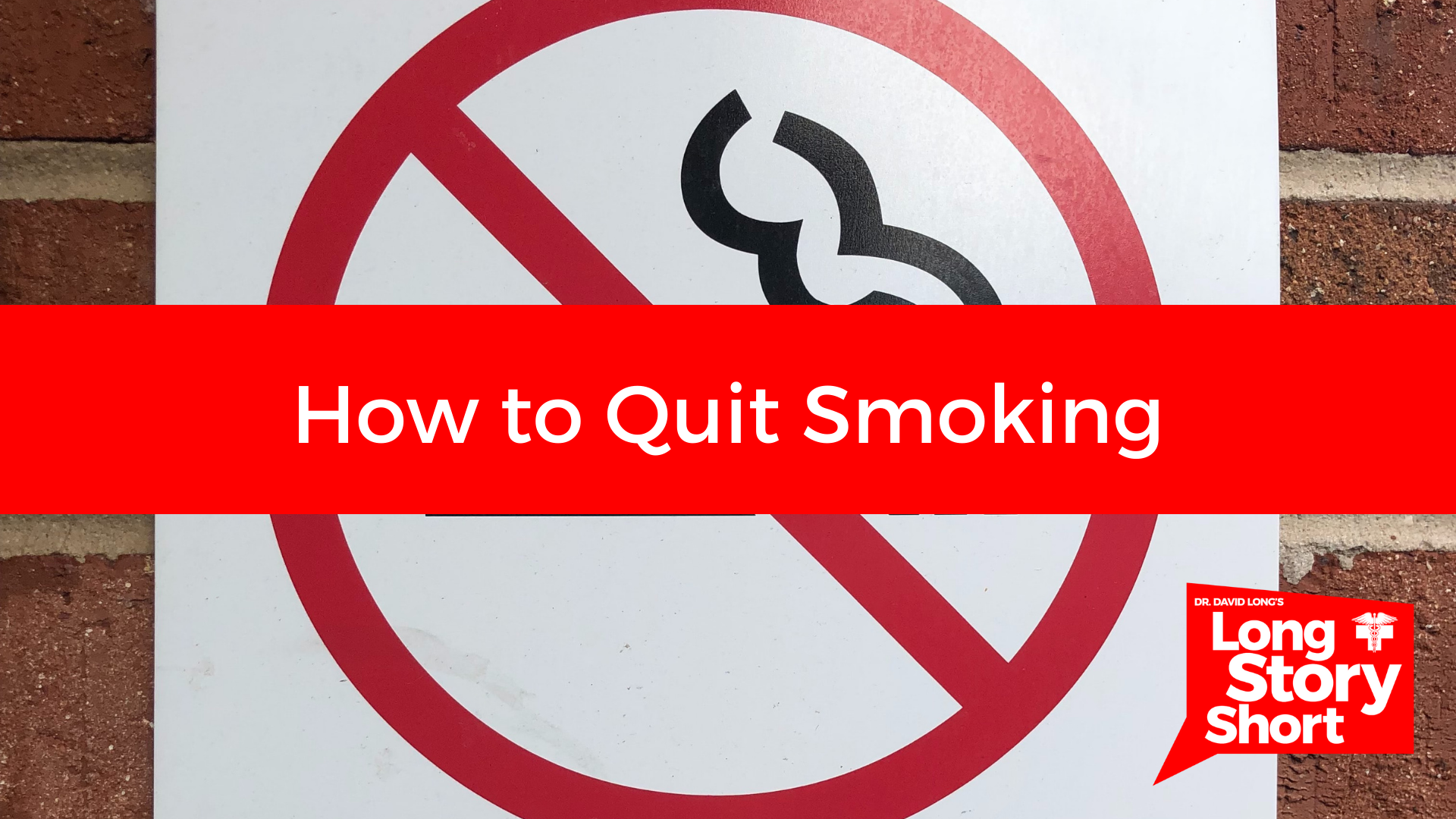How to Quit Smoking Summary
There are so many benefits to not smoking! Quitting smoking has the ability to improve your health and quality of life too! It also reduces the risk for many health issues like poor reproductive health, cardiovascular diseases, and even cancer.
• People trying to quit smoking will likely start and stop multiple times before they are successful.
• It is important to remember that you cannot just stop smoking, you must replace it with something else.
• Positive thinking can help increase the chance of success when quitting smoking.
• Knowing your triggers (what makes you want to smoke) can help avoid cravings.
• There are medications available to help with nicotine cessation, including patches, gum, and Chantix.
• Vaping is not as deadly as smoking cigarettes; however, it is still tying your sense of peace to an intoxicating chemical which is not ideal
Full Text
So you want to stop smoking? Here’s the trick. You can’t just stop. I’m Dr. David Long. I’d like to spend a few minutes talking to you today about smoking cessation.
A person who tries to quit smoking will likely start and stop somewhere between six and 40 times. And that’s okay. The main thing we have to remember about stopping smoking is that you can’t just stop it. You must replace it. Nobody smokes because they’re a bum, a loser with no self control. You smoke because your brain has identified nicotine as stress relief. They’re one in the same. If you and I both go into the parking lot and we both have a flat tire, the inclination to have a cigarette would not occur to me. That is not because of some impeccable character quality or because of my intestinal fortitude or self control. It’s because my brain has not identified nicotine as a relief of stress and the smokers has. So if we’re going to combat that love relationship between our brains and nicotine or any other intoxicating substance, we have to replace it with some other healthier means of stress relief. So here are some hints to help you succeed in stopping smoking.
Number one, focus on the why. Why do you want to quit? Hopefully it’s not because you just got diagnosed with lung cancer, or you just had your second heart attack. We’d like for you to have a why to stop smoking much earlier than that. You’d like to be able to play with your grandkids. You’d like to be able to enjoy your retirement. You’d like to be healthy and set good examples for your small children.
Those are great reasons why we might want to stop smoking that can motivate us when otherwise we don’t feel very motivated to stop. Stay positive. We know that someone who reframes their life in positive ways has a much better chance of success than the person who’s constantly entertaining negative thoughts, and just repeating a negative narrative of, “What’s the point, who cares, I just want to do what I want to do.” Those kinds of thoughts, keep us sick and predispose us to relapse.
Another thing that can be very helpful is to think about how much money you’ll be saving. The taxes on cigarettes go up and up and up. Incidentally, it’s one of the few taxes in the world that I don’t really have a problem with, given how expensive to the community smoking is in the long run, given the medical problems that come about. And when a person really begins to fall apart from their smoking, is when they’re a little older. Commonly they’re off their employer’s insurance and they’re on Medicare. So it’s one of the reasons why regular commercial general insurances aren’t quite as aggressive about non-smoking campaigns as they should be. It’s because most of them know that by the time you become very expensive from your smoking, you’ll be Medicare’s, thus the taxpayer’s problem. So I’m okay with taxing cigarettes, but think about all the money you’ll save.
If you stop, prepare healthy snacks, to help you with cravings, cravings are going to come out of the blue and just slam you in the face and you are going to really want a cigarette. And what we know is that if we can have something else to fill your hands, something else to do with your hands and something to snack, some exercise, get to help, get your mind off of it because you cannot simply choose not to crave. We have to sort of trick your brain to look the other direction. And then the craving will go away.
Next, know your triggers. If you know that every time you speak with your mom, you’re going to be stressed out. If you know that every time you have to deal with your husband, you’re going to be stressed out. Then I would encourage you to go into that preparing for that stress and either meditate or exercise or calm yourself by some other means so that you’re not compelled to reach for the cigarette that your brain remembers will fix that stress. It fixes it while it makes it worse. There are medications that can be very helpful for smoking cessation, specifically for nicotine cessation patches and gum as nicotine replacement can be very helpful. They can help separate the behavioral from the chemical habit. Smoking has two components. You need that nicotine to help soothe your cravings for nicotine, but also the behavior portion of it.
Every time you get in the car, after you have a good meal, every time you sit on the porch– these are behaviors that we quickly associate with smoking, and it’s helpful sometimes to separate those and other things that can be helpful. Buproprion medicine, otherwise known as Wellbutrin can be helpful to minimize the cravings, but the best medicine so far to help with nicotine cessation is Chantix.
Now I can always tell when a patient really wants to quit smoking or they want to appear as if they want to quit smoking. Here’s what each one looks like. If I mentioned Chantix to the person who doesn’t really want to quit smoking, they immediately tell me about all the side effects of Chantix, not realizing the irony of all of the side effects of smoking. They tell me how much Chantix costs, which is the equivalent of a half a pack a day habit.
So to just briefly to go through those side effects, most commonly with Chantix is nausea, which can be avoided by taking it with a full meal. The next most common side effect, which is about 25% of patients is really vivid, sometimes unpleasant dreams. And then thirdly, and I haven’t ever a patient have to stop Chantix because of this, but it is recognized that sometimes people can have a really severe depression. Truth is, I’m not sure if that’s from the Chantix or because that person’s brain is rebelling from the thought of not having their nicotine available anymore and making them depressed. But anyhow, if a person is taking Chantix, they stop smoking. If they get very depressed, I would recommend they stop the Chantix.
So if you have one side effect of nausea that you can get around, the second side effect of strange dreams, you got to suck it up, it’s worth it. And the third side effect, if you were one of these people who had a sudden decrease in mood with suicidal ideations and the like, you’d have to stop the medication.
One last thing I’d remember about stopping smoking is to understand the value of a relapse. Don’t throw your hands up and just give up if you go back to smoking. But every time we relapse, we learned something about our relationship with this chemical. We learned something about what worked in the past and what didn’t work, and that prepares you to be more successful next time. As long as there is breath in your lungs, there is hope that you will be free from the obsession to use nicotine.
One last topic that I’d like to cover is the idea of vaping. “Dr. Long, vaping so much better than smoking, right?” Well, we have to break that down. I think it’s safe to say that compared to smoking, vaping is not as deadly. Now note, I did not say vaping is safe, but compared to smoking and all of the other carcinogens and toxins that are in cigarettes, vaping is probably preferable, but in either case, be it vaping or smoking, we are tying our sense of peace, our serenity to an intoxicating chemical. And I’m never okay with that. I don’t want anyone to feel better because they took an addictive substance. I want you to feel better because you repaired a relationship, because you did yoga, because you learned a new skill. You read a good book, you had a good meal, these kinds of things. And vaping’s just the same as smoking in that regard. So, well, what about vaping as a means of coming off cigarettes? My advice would be it’s worth a try if it works for you. Great. What we commonly see in those situations is that the person switches from smoking to vaping, and then they can sort of lower down the nicotine. And that works for a while. Their brain says, uh, thanks for the vaping. We appreciate the nicotine, but you know, you’re feeling really stressed today. And you know, what would really fix it is that pack of Marlboros, not this vaping. And we see a large percentage of patients relapse back to smoking because they were still poking that same part of the brain with nicotine, just to a vape pen rather than a cigarette.
I hope that some of this was useful to you today. If you’d like more information, you can click on the link below or give us a call at Lubbock Cooper Health Center. Thank you.





 and then
and then